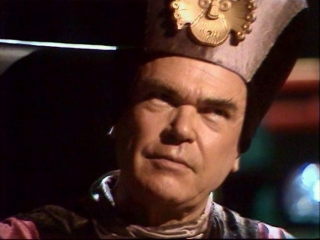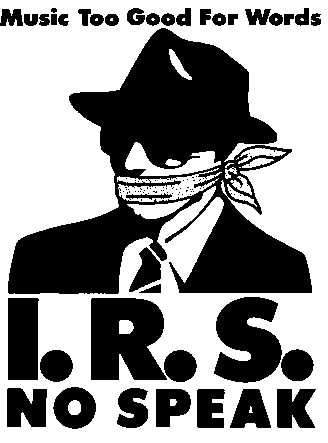The Top Ten Taxmen in Pop Culture
 |
Happy Tax Day, everybody! Well, maybe “happy” is too strong a word, but have at least a day of enjoyable grumbling. Since the mid-20th Century, the Ides of April is the deadline (when it falls on a weekday) for Americans – or at least for that 53% of Americans not thought by a recent Presidential candidate to completely suck as human beings – to file a federal income tax return. It’s also an unofficial day to whine about it, when even supposedly progressive types like to put their civic-mindedness on hold and gripe a little about the long arm and upturned palm of government. Hence, in pop culture, Uncle Sam’s field agents the taxmen are usually not the most likable sorts. Even in the New Testament, after all, they’re seen favorably only by comparison to the Pharisee. The preference is by no means universal, and typically tax collectors are depicted as unpleasant, if not actually sinister. Here are ten notable specimens of “revenuer”:
10.) The Taxman in Popeye (1980)
When the title sailor-man (Robin Williams) arrives in the not-so-sweet village of Sweethaven, the first person to accost him in Robert Altman’s live-action version of the cartoon classic is this bicycle-borne revenuer, played by the excellent Donald Moffat. Calling himself an “exact change” taxman, he’s of the nattering, pedantic school of officialdom, and hits Popeye up at once for Docking Tax (twenty-five cents), a New in Town Tax (seventeen cents), a Rowboat Under the Wharf Tax (forty-five cents) and a Leaving Your Junk Lying Around the Wharf Tax (a dollar). Popeye asks a question, and is warned that there’s a “nickel Question Tax.” Presumably this is different from the “Curiosity Tax” he races off to levy on some onlooking kids.
9.) Elliot Snyder in Grumpy Old Men (1993)
The IRS agent in this favorite of the Old Country Buffet set, who seeks to snatch the house of John Gustafson (Jack Lemmon) over an accidental underpayment, isn’t necessarily the most memorable of pop-culture taxmen. But we’re just getting warmed up here, and as played by the redoubtable Buck Henry, Snyder is our baseline, a classic example of the stereotype: relentless, condescending and unable to conceal a streak of spiteful pleasure in what he’s doing. Walter Matthau’s Max Goldman puts even his lifelong enmity to his neighbor Gustafson on hold to help him elude this creepy functionary.
8.) Gatherer Hade in Doctor Who: The Sun Makers (1977)
Hade is an authority figure on the planet Pluto – still considered a planet in those days – in charge of collecting unconquerable tax debts from the human colonists that live there in the distant future. The government which demands these levies isn’t democratic, it’s the venerated “Company” that runs the colonies; quite literally a plutocracy. The Tom Baker incarnation of The Doctor, Leela and K9 get caught up in (and help to foment) the unrest that leads to Hade’s undoing. Played with gusto by the aptly-named Richard Leech, Hade is a grandly odious toadying villain, officious to subordinates, fawningly obsequious to superiors. If Elliot Snyder is the baseline of rotten taxmen, Hade is the Shakespearean ultimate.
7.) Lorenzo Charlton in The Mating Game (1959)
Then again, not all fictitious taxmen are unsympathetic. Here’s a rare case of a taxman who gets to be the hero, and get the girl: Debbie Reynolds, no less. Played by Tony Randall, Lorenzo is the foil of this feature-length farmer’s daughter joke from MGM, derived from The Darling Buds of May by H. E. Bates. The farmer in question, played by affable Paul Douglas, has been ratted out to the IRS by his uppity neighbor (Philip Ober); Lorenzo is sent to rural Maryland to investigate, and soon discovers that the fellow, who happily subsists by barter, has never filed a return. Lorenzo’s rather appalled at the lackadaisical attitude of “irresponsible people” who have “no ambition, no goals, just eat, drink, have a good time…” Appalled at first, that is. The flirty, haystack-romping daughter soon has him looking for a loophole.
6.) Oscar Wallace in The Untouchables (1987)
“Do you carry a badge?” Sean Connery’s Malone asks Wallace, the mild-mannered Bureau accountant played by Charles Martin Smith (and inspired by legendary Internal Revenue investigator Frank J. Wilson) in Brian De Palma’s gangster melodrama. Wallace meekly replies in the affirmative, and Connery hands him a shotgun. “Carry a gun,” he commands. The milquetoast fellow obeys, and the result is almost certainly the rootin’-est, tootin’-est tax investigator in the history of movies, cheerfully blasting away at the bootleggers. He only (spoiler alert!) makes it about halfway through the flick, alas, but thanks to his obsessive number-crunching, Capone (who beats the rap on murder) goes up the river for tax evasion.
5.) Harold Crick in Stranger Than Fiction (2006)
Marc Forster’s high-concept comedy featured Will Ferrell in a low-key turn as Harold, an IRS auditor who becomes a sort of Kafka-lite hero when he starts hearing a woman’s voice narrating his life, as if he’s the protagonist of a literary fiction novel. Along with trying to come to terms with this upsetting situation, Harold – an isolated, routine-bound sort with no family or friends – falls in love with a woman he’s auditing, a baker (Maggie Gyllenhaal) who has declined to pay that part of her tax that goes to excessive defense spending and the like. She greets him initially by calling him a “miscreant” and yelling “Get bent, taxman!” upon which the onlookers in the bakery vigorously boo and jeer the hapless Harold.
4.) George Harrison’s “Taxman”
The familiar track from the Fabs 1966 masterpiece Revolver was an early George Harrison composition, not a Lennon-McCartney collaboration. An uncharacteristically pissed-off little ditty for Harrison (“Should five per cent appear too small/Be thankful I don’t take it all…”), it seems to have been occasioned, as resentment of “The Taxman” so often is, by George finding himself rich, and learning that this meant, in Britain at the time, a tax rate upwards of 90%. Apparently, Mr. Spiritual Here Comes the Sun couldn’t bring himself to say, of this policy, it’s all right, doo doo doo doo, doo doo doo, doo doo doo… etc. Anyway, above you can see the “Taxman” episode of the Beatles’ ’60s-era Saturday-morning cartoon show.
3.) The I.R.S. Records guy
 |
To continue the rock-and-roll theme: let’s not forget the cool but sinister-looking little dude who graced the label of this lively record company founded in 1979 by Miles Copeland, brother of Police drummer Stewart Copeland, and whose stable included, at one time or another, such luminaries of the big-hair-and-wine-cooler decade as R.E.M., The Go-Gos, Oingo Boingo, The Cramps, The Fleshtones, Concrete Blonde and Wall of Voodoo, among many others. The company’s initials actually stand for International Record Syndicate, but the coy usage, coupled with the ominously unsmiling Man In Black-type visage in shades and fedora, seem clearly meant to suggest the sort of official who would say, in response to any complaints that he was overtaxing, “Be thankful I don’t take it all.” In what may have been a gratifying embellishment, on labels for the company’s instrumental-only wing I.R.S. No Speak, the I.R.S. guy appeared wearing a gag.
 |
2.) Ray Don on Designing Women
In the endlessly rerun sitcom’s pilot episode, Ray Don (Arlen Dean Snyder) is a smarmy, nervy guy who attempts to insinuate himself into the ladies’ table at a sushi bar, and finds himself treated to one of those signature arias of righteous high dudgeon from Julia (Dixie Carter):
“There’s no need for introductions, Ray Don, we know who you are…You’re the guy who’s always wherever women gather or try to be alone. You want to eat with us when we’re dining in hotels, you want to know if the book we’re reading is any good, or if you can keep us company on the plane…And I want to thank you, Ray Don, on behalf of all the women in the world, for your unfailing attention and concern…But read my lips and remember, as hard as it is to believe, sometimes we like talking just to each other, and sometimes we like just be alone…”
In a later episode, Julia gets audited, and just who do you suppose, according to the laws of sitcom wackiness, shows up to perform it? None other than Ray Don, that’s who! She attempts to keep her face concealed during their interview, but the unmistakable, disdainful inflection with which she pronounces Ray Don’s name blows her cover in the end.
1.) Irwin R. Schyster
Professional wrestling needs bad guys that the crowds will love to hate, stock villains that cut straight to the loathing centers of the brain. Who better, or worse, than a taxman? A classic “heel” in the WWF in the first half of the ’90s, Irwin R. Schyster, note the initials, wore office-drone drag: a white dress shirt, black slacks, suspenders and a tie, and sneered at his opponents and the fans alike as “tax cheats.” Schyster (aka Mike Rotunda) was free with tax advice, usually along these lines: “I’m reminded of a quote by Benjamin Franklin, who once said that in the world only two things are certain: death and taxes. Well, Ben was right. He died, and YOU still have to file a tax return.” Or, more succinctly: “Quit your crying and pay what’s due, or I.R.S. will audit you!”
His finishing move, naturally, was called the Write-Off.
